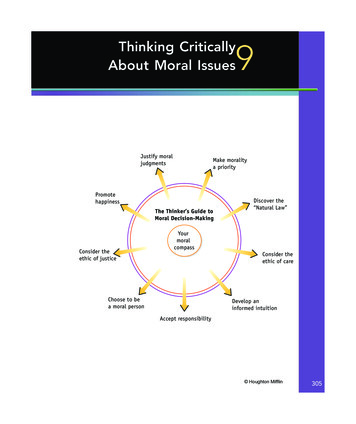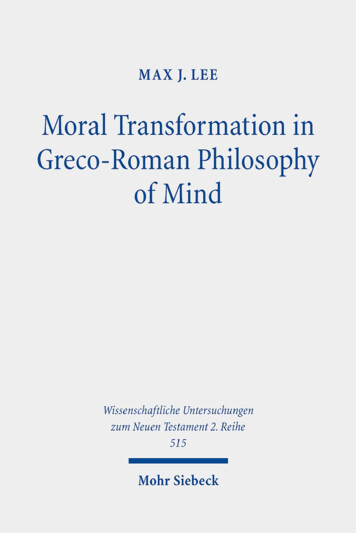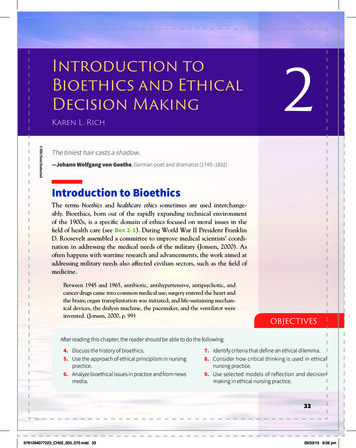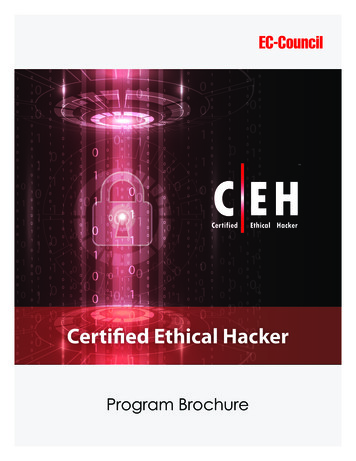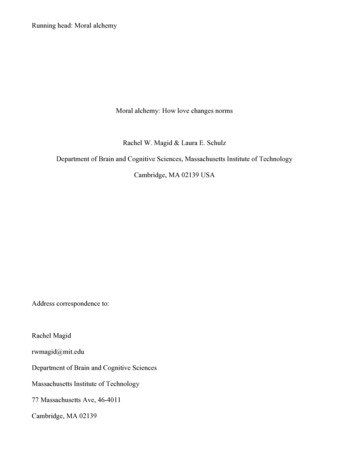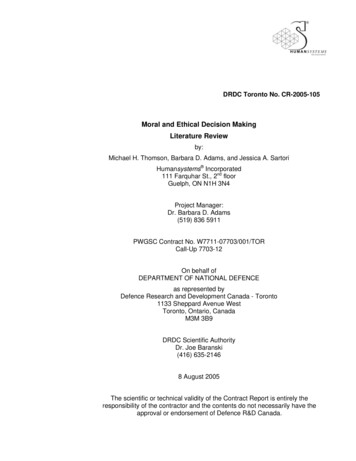
Transcription
DRDC Toronto No. CR-2005-105Moral and Ethical Decision MakingLiterature Reviewby:Michael H. Thomson, Barbara D. Adams, and Jessica A. SartoriHumansystems Incorporated111 Farquhar St., 2nd floorGuelph, ON N1H 3N4Project Manager:Dr. Barbara D. Adams(519) 836 5911PWGSC Contract No. W7711-07703/001/TORCall-Up 7703-12On behalf ofDEPARTMENT OF NATIONAL DEFENCEas represented byDefence Research and Development Canada - Toronto1133 Sheppard Avenue WestToronto, Ontario, CanadaM3M 3B9DRDC Scientific AuthorityDr. Joe Baranski(416) 635-21468 August 2005The scientific or technical validity of the Contract Report is entirely theresponsibility of the contractor and the contents do not necessarily have theapproval or endorsement of Defence R&D Canada.
AbstractThis report outlines the Department of National Defence’s approach to moral and ethical decisionmaking outlined in the Defence Ethics Program (DEP), and considers the scientific and militaryresearch pertaining to moral and ethical decision making.This work discusses the various conceptual definitions of morality and ethics, and explores theDefense Ethics Program in detail. The DEP argues that several factors influence moral and ethicaldecision making, which are reviewed. Following this, both formal and informal CF trainingmechanisms that address moral and ethical decision making are explored.The second part of this review considers the academic and military literature relevant to moral andethical decision making. More specifically, it suggests that both rational and intuitive decisionmaking processes are likely to play an important role in ethical decision making. In addition,several other factors, such as emotion, culture, and an individual’s self-concept are also likely toinfluence moral and ethical judgements and action. Moreover, efforts to understand moral andethical decision making must also consider the operational realities that confront the CF in today’smilitary campaigns. These research areas have the potential to promote a complex model of ethicaldecision making in military operations.Humansystems IncorporatedMorals & Ethical Decision MakingPage i
RésuméDans le présent rapport, nous décrivons l'approche du ministère de la Défense nationale à l'égard dela prise de décision morale et éthique présentée dans le Programme d'éthique de la Défense (PED)et nous examinons la recherche scientifique et militaire dans ce domaine. Nous traitons desdiverses définitions conceptuelles de la morale et de l'éthique et nous étudions en détail leProgramme d'éthique de la Défense. Selon le PED, plusieurs facteurs influent sur la prise dedécision morale et éthique, et ces facteurs sont examinés dans le rapport. Ensuite, nous nouspenchons sur les mécanismes de formation des FC tant officiels qu'officieux qui touchent la prisede décision morale et éthique. De façon générale, nous avons constaté que le PED décrit la prise dedécision éthique comme étant principalement un processus cognitif linéaire rationnel. Cetteapproche contraste avec les descriptions du personnel militaire ainsi que la documentation courantequi laisse entendre que l'intuition, les émotions, la culture et l'idée qu'un individu se fait de luimême jouent aussi un rôle déterminant en ce qui a trait aux actions et aux jugements moraux etéthiques. En outre, pour bien comprendre la prise de décision morale et éthique, il faut prendre enconsidération les réalités opérationnelles auxquelles les FC font face dans les campagnes militairesmodernes.Page iiMorals & Ethical Decision MakingHumansystems Incorporated
Executive SummaryThis project reviews the results of a keyword search for the research literature relevant to moraland ethical decision making. The purposes of this review were: To explore current CF thinking on military ethics (e.g. the Defence Ethics Program) as itpertains to and impacts on command decision making To link the current CF approach with existing theoretical and empirical work in thescientific and military literature relevant to moral and ethical decision making in themilitary contextTo explore the factors that influence moral and ethical decision making within militarycontextsThe search of the databases generated approximately 300 titles and abstracts, of which we reviewedin detail approximately 50 articles and books. These titles were drawn from research in areas suchas behavioural sciences, organizational theory, philosophy, as well as military theory and research.The report contains sections reviewing theory and research relating to: Historical underpinnings of moral and ethical decision making in military contexts. The interface between military ethics and military law. Definitions of moral and ethical concepts.Canadian Forces approach to moral and ethical decision making (e.g. Statement of DefenceEthics).Description of the factors that impact on ethical decision making.Moral and ethical training and doctrine in the Canadian Forces.Advancing ethical decision making theory and research.This review first considers the Defence Ethics Program (DEP) and explores its cornerstonedocuments, as well as how this program has guided CF efforts to better understand moral andethical decision making.The second part of this document considers the academic and military literature related to ethicaldecision making more generally. Specifically, it suggests that both rational and intuitive decisionmaking processes are likely to play an important role in ethical decision making. In addition,several other factors, such as emotion, culture, and an individual’s self-concept are also likely toinfluence moral and ethical judgements and action in operational settings. Moreover, efforts tounderstand moral and ethical decision making must also consider the operational realities thatconfront the CF in today’s military campaigns. The review identifies these areas as avenues toexplore in order to advance understanding of moral and ethical decision making in militarycontexts.Humansystems IncorporatedMorals & Ethical Decision MakingPage iii
THIS PAGE INTENTIONALLY LEFT BLANKPage ivMorals & Ethical Decision MakingHumansystems Incorporated
SommaireDans le cadre du présent projet, nous examinons les résultats d'une recherche par mots clés en cequi a trait aux comptes rendus de recherche touchant la prise de décision morale et éthique. Lesbuts de l'examen sont les suivants : Examiner les idées des FC sur l'éthique militaire en relation avec la prise de décisionunilatérale et à quant à son incidence sur celle-ci Établir des liens entre l'approche actuelle des FC et certains travaux théoriques etempiriques dans la documentation scientifique et militaire touchant la prise de décisionmorale et éthique dans le contexte militaire Examiner les facteurs qui influent sur la prise de décision morale et éthique dans descontextes militairesLa recherche dans les bases de données a produit environ 300 titres et résumés, parmi lesquels nousavons examiné en détail quelque 50 articles et ouvrages. Ces titres proviennent de la recherchedans des domaines comme les sciences du comportement, la théorie des organisations, laphilosophie ainsi que la théorie et la recherche militaires.Le rapport contient des sections qui examinent la théorie et la recherche portant sur les sujetssuivants: Les fondements historiques de la prise de décision morale et éthique dans des contextesmilitaires. Le rapport entre l'éthique militaire et le droit militaire. Les définitions des concepts de morale et d'éthique. L'approche des Forces canadiennes en ce qui a trait à la prise de décision morale et éthique(p. ex. Énoncé d'éthique de la Défense). La description des facteurs qui influent sur la prise de décision éthique. La formation et la doctrine en matière de morale et d'éthique au sein des Forcescanadiennes. Faire progresser la théorie et la recherche concernant la prise de décision éthique.L'examen laisse entendre que l'approche actuelle des Forces canadiennes à l'égard de la prise dedécision éthique est bien fondée, globale et systématique tant du point de vue conceptuel que dupoint de vue pragmatique. Il est clair que le Programme d'éthique de la Défense a contribué defaçon significative à la mise en valeur de la prise de décision morale et éthique.Parallèlement, le rapport signale toutefois plusieurs façons d'améliorer encore davantage l'approchedes Forces canadiennes à l'égard de la prise de décision morale et éthique. De façon générale, nousavons constaté que le PED décrit la prise de décision éthique comme étant principalement unprocessus cognitif linéaire rationnel. Cette approche contraste avec les descriptions du personnelmilitaire, ainsi que la documentation courante qui laisse entendre que l'intuition, les émotions, laculture et l'idée qu'un individu se fait de lui-même jouent aussi un rôle déterminant en ce qui a traitaux actions et aux jugements moraux et éthiques. En outre, pour bien comprendre la prise deHumansystems IncorporatedMorals & Ethical Decision MakingPage v
décision morale et éthique, il faut également prendre en considération les réalités opérationnellesauxquelles les FC font face dans les campagnes militaires modernes. L'examen met ces domainesen évidence comme étant des voies à étudier pour accroître la compréhension de la prise dedécision morale et éthique dans des contextes militaires.Page viMorals & Ethical Decision MakingHumansystems Incorporated
Table of ContentsABSTRACT .IRÉSUMÉ . IIEXECUTIVE SUMMARY .IIISOMMAIRE .IVTABLE OF CONTENTS . VIILIST OF FIGURES AND TABLES.IX1INTRODUCTION . 11.11.21.31.41.51.62METHOD AND RESULTS . 32.12.22.32.42.52.62.73HISTORICAL PERSPECTIVES ON WAR . 7BASIS OF MORAL AND ETHICAL DECISION MAKING AND CONDUCT IN MILITARY OPERATIONS . 8APPLICATION OF MILITARY THEORY AND LAW TO ARMED CONFLICT . 13SUMMARY: THE PATH TO MORAL AND ETHICAL DECISION MAKING IN MILITARY CONTEXTS . 16CF APPROACH TO MORAL AND ETHICAL DECISION MAKING. 194.14.25KEYWORDS . 3DOMAINS OF RESEARCH . 3DATABASES . 4THE SEARCH . 4SELECTION OF ARTICLES . 5REVIEW OF ARTICLES . 5STRUCTURE OF THE REPORT . 5INTRODUCTION . 73.13.23.33.44BACKGROUND. 1PURPOSE . 1SCOPE . 1WORK ITEMS . 1DELIVERABLES . 2ACRONYMS . 2DEFINITIONS . 19CF APPROACH TO MORAL AND ETHICAL DECISION MAKING . 20IMPLEMENTATION EFFORTS . 385.15.25.35.45.5DEFENCE ETHICS PROGRAM TRAINING PROGRAM . 38ACADEMIC TRAINING IN MORAL AND ETHICAL DECISION MAKING . 40INDIRECT APPROACHES TO IMPROVING MORAL AND ETHICAL DECISION MAKING IN CF . 41ASSESSING THE EFFECTIVENESS OF MORAL AND ETHICAL TRAINING IN THE CF. 42SUMMARY . 46Humansystems IncorporatedMorals & Ethical Decision MakingPage vii
6ADVANCING THE CF APPROACH TO MORAL AND ETHICAL DECISION MAKING .486.1ADVANCING PSYCHOLOGICAL ASPECTS OF THE DEP.486.1.1 Moral and Ethical Decision Making as a Unique Process .486.1.2 Challenges to Purely Rational Models of Decision Making.496.1.3 The Role of Intuition in Moral and Ethical Decision Making .516.1.4 The Role of Emotions .566.1.5 The Role of Cultural Context.616.1.6 The Role of the Self.656.1.7 The Changing Context of Military Operations.686.2ADVANCING PHILOSOPHICAL UNDERPINNINGS .706.2.1 Why Should I Be Moral? .706.2.2 Deciding What is Ethical.716.2.3 Translating Ethics into Action.726.3SUMMARY .737.PRIMARY REFERENCES .757.1Page viiiSECONDARY ARTICLES .79Morals & Ethical Decision MakingHumansystems Incorporated
List of Figures and TablesTABLE 1. KEYWORDS . 3FIGURE 1: DEFENCE ETHICS PROGRAM DOCUMENTS. . 20FIGURE 2: DEP MORAL AND ETHICAL DECISION MAKING . 26FIGURE 3: ISSUE-CONTINGENT MODEL OF ETHICAL DECISION MAKING IN ORGANIZATIONS (JONES, 1991) . 34FIGURE 4: MAJOR ELEMENTS OF CF EFFECTIVENESS (WENEK, 2003). 42FIGURE 5: SOCIAL INTUITIONIST MODEL (HAIDT, 2001). . 53FIGURE 6: RISK-AS-FEELINGS PERSPECTIVE (LOWENSTEIN, WEBER, HSEE, AND WELCH, 2001). . 59Humansystems IncorporatedMorals & Ethical Decision MakingPage ix
THIS PAGE INTENTIONALLY LEFT BLANKPage xMorals & Ethical Decision MakingHumansystems Incorporated
1Introduction1.1BackgroundThis review stems from the work of the Command Effectiveness and Behaviour (CEB) section atDefence Research and Development Canada (DRDC) in Toronto. CEB has focused previousresearch efforts on command and control issues, stress and coping, trust in small military teams, anddecision-making performance. This review extends the scope of ongoing decision making researchto explore the literature on moral and ethical decision making. In April 2003, the CEB Section ofDRDC Toronto was awarded a Technology Investment Fund (TIF) grant to undertake a 3-yearresearch program exploring command decision-making with a focus on moral and ethical reasoningand decision-making. This suggests that this topic is of considerable interest to the Canadian Forces.This work reviews previous and recent work in the area of moral and ethical decision making andthe approach taken by the CF. Subsequently, we highlight possible areas of future research likely tobe important for understanding moral and ethical decision making within military contexts.1.2PurposeThe purpose of this literature review is to develop ideas related to the empirical investigation ofmoral and ethical decision making within CF operational contexts. The literature review is intendedto: Explore the CF approach to moral and ethical decision making; Present empirical and theoretical work in the scientific and military literature relevant tomoral and ethical decision making in military contexts; Explore the factors that influence moral and ethical decision making within militarycontexts.1.3ScopeThe literature review focuses on available theory and research relevant to moral and ethical decisionmaking within Canadian military contexts.Our primary focus is the moral and ethical decisions that military commanders make in operationalcontexts. As command decision making occurs at tactical, operational, and strategic levels, all ofthese levels were seen as relevant to the present discussion. In addition, multinational issues relatedto moral and ethical decision making are also explored.There are, of course, many different kinds of ethical decisions. At a simple administrative level, forexample, military personnel must make decisions about relatively small gifts. At the operationallevel, ethical decision making has very serious ramifications for human life. Although our focus isadmittedly more on the more serious forms of ethical decisions within operational contexts, theentire range of such decisions was deemed to be within the scope of this review.1.4Work ItemsThe following work items were performed:Humansystems IncorporatedMorals & Ethical Decision MakingPage 1
A search of the literature to identify relevant journal articles, reports, books, etc. pertainingto moral and ethical decision making; References to relevant literature were recorded in an EndNote database; Approximately 50 articles were selected from those identified in the search, and reviewed; A report documenting the results of the literature was written.1.5DeliverablesThe following deliverables were created under this contract: An EndNote bibliography of pertinent titles on moral and ethical decision making andrelated topics, including all articles identified as of interest; Paper copies of the articles reviewed (or microfiche if paper copies were not available); A report on the literature review.1.6Page 2AcronymsCFCanadian ForcesCRSChief Review ServicesDEPDefence Ethics ProgramDHRREDirector of Human ResourcesResearch EvaluationDPKOUN Department ofPeacekeeping OperationsDNDDepartment of National DefenceDNDEQDepartment of NationalDefence EthicsQuestionnaireEABEthics Advisory BoardECSEnvironmental Chief of StaffLOACLaw of Armed ConflictNDMNaturalistic decision makingRLNARoyal Netherlands ArmyROERules of EngagementRPDRecognition primed decision makingRPFRwandan Patriotic FrontOOTWOperations Other Than WarUNUnited NationsUNAMIRUnited Nations Assistance Mission forRwandaMorals & Ethical Decision MakingHumansystems Incorporated
2Method and Results2.1KeywordsWe developed a set of keywords for the literature search based on our experience with the pertinentscientific literature on moral and ethical decision making, as well as relevant concepts related to themilitary.The keywords were divided into several categories (see Table 1). This division allowed pairing ofnon-overlapping keywords for the search. Keywords could be combined in any way that yielded aproductive number of references (that is, not too large a number to inspect or too few to providereasonable coverage of the topic). The "core concept" category was included for two reasons. First,the keywords in that category focused the search on topics directly related to moral and ethicaldecision making. Second, they were intended to identify any other related theoretical approaches orconceptualizations that might be relevant.Table 1. KeywordsCategoryKeywordRelated KeywordsCore ConceptsEthic*Principles, good, fair, decent, just, virtues, integrity,honest, honourableMoral*Right, normative, duty, code of conduct, properDecision MakingReasoning, judgement, verdict, resolution, choice,assessment, evaluation, dilemma, naturalistic,rationalisticMilitary DomainMilitaryRules of Engagement (ROE), service (army, navy, air),arm (infantry, SWC, ASWC, etc.), rank, strategic,tactical, training, Canadian Forces, soldier, war, tactics,operational, doctrine, rules, codeSocietal FactorsSocietyAttitudes, beliefs, religion, comradeship, fraternisation,respect, customs, philosophy, ideology, beliefs, values,customs, manners, lawOrganizational FactorsOrganizationGroup-shared values, professionalism, doctrine, militarylawIndividual DifferencesIndividual differencesMotivation, individuality, gender, experience, culture,identity2.2Domains of ResearchThe domains of research were numbered. They included the following areas: CF documents (e.g. Defence Ethics Program); Behavioural Science; Philosophy; Business/Organizational Theory; and Military.Humansystems IncorporatedMorals & Ethical Decision MakingPage 3
A number of the articles were drawn from studies of moral and ethical decision making in thebehavioural sciences, as researchers in this domain have spent a considerable amount of effortlooking at issues of morality and decision making in combination. As such, research and theorythat explores ethical decision making outside of the specific military domain comprises a portion ofthis review. We also searched specifically for articles related to moral and ethical decision makingin the military domain and selected several articles.2.3DatabasesSearches were conducted of the following databases and sources: PsychInfo; National Technical Information Service (NTIS); Canada Institute for Scientific and Technical Information; World Wide Web (WWW); and Philosophers Index.PsychInfo is a department of the American Psychological Association (APA) that offers products toaid researchers locate psychological literature. Their database is based on Psychological Abstractsand contains non-evaluative summaries of literature in psychology and related fields (e.g., humanfactors, education, business and social studies). The database contains over one millionelectronically stored bibliographic references with authors, titles, publication information, andabstracts or content summaries, covering material published in over 45 countries since 1967.References include journal articles, dissertations, reports and book chapters.NTIS is an agency of the U.S. Department of Commerce’s Technology Administration. It is theofficial source for government sponsored U.S. and worldwide scientific, technical, engineering, andbusiness related information. The database contains almost three million titles, including 370,000technical reports from U.S. government research. The information in the database is gathered fromU.S. government agencies and government agencies of countries around the world.CISTI houses a comprehensive collection of publications in science, technology, and medicine. Itcontains over 50,000 serial titles and 600,000 books, reports, and conference proceedings fromaround the world.Philosophers Index is a database available on the World Wide Web that contains informationpertaining 50 major philosophers and thousands of philosophical subjects.2.4The SearchWe searched databases by applying keywords from different categories in combination. Forexample, we combined a keyword from the Core Concept category with one from the militarydomain category. The results of this pairing were used to determine whether the combinationneeded to be redefined to be more or less inclusive. When a combination yielded too manyreferences, we systematically added keywords from other categories to focus the search. When thecombination yielded too few references, we dropped one of the keywords from the combination orreplaced one keyword with a related term.Page 4Morals & Ethical Decision MakingHumansystems Incorporated
Another source of potentially relevant references was the set of articles obtained for review. Wealso identified articles cited in the reference lists of the articles obtained for the review on the basisof their potential relevance to moral and ethical decision making.2.5Selection of ArticlesThe search of the databases generated approximately 300 titles and abstracts. We reviewed theseand categorized each by its priority (high, medium or low) to the purpose and scope of the literaturereview. Priority was based on the extent to which the article seemed to apply to the main categoriesof keywords developed earlier (Table 2.1). Once titles and abstracts were prioritized, we identifiedthe approximately 60 sources that were rated as highest priority and obtained as many of these aspossible. We were able to obtain approximately 50 for review, which covered a range of researchareas, from which we focused on issues relevant to moral and ethical decision making.We also identified about 70 secondary references. The references comprise books, journal articlesand technical reports from the behavioural sciences, military research, philosophy, and businessdomains.2.6Review of ArticlesWe read each of the approximate 50 articles obtained for review in detail, taking notes. Afterreviewing approximately 30 of these, we developed a broad outline of the major issues. We usedthis outline to categorize the applicability of articles and to further focus review of the obtainedarticles.2.7Structure of the ReportThe first section of this report describes the historical underpinnings of moral and ethical decisionmaking in military contexts and considers the interface between military ethics and military law.Following this, we investigate the Canadian Forces Defence Ethics Program, its conceptualdefinitions pertaining to ethics and morality, and its approach to moral and ethical decision making.The following section addresses current CF training programs related to moral and ethical decisionmaking. The final section identifies specific research areas likely to further advance theunderstanding of moral and ethical decision making in a military context. More specifically,additional consideration of intuition, emotion, culture and individual’s self concept may help tofurther enhance the understanding of ethical decision making within military contexts.Humansystems IncorporatedMorals & Ethical Decision MakingPage 5
THIS PAGE INTENTIONALLY LEFT BLANKPage 6Morals & Ethical Decision MakingHumansystems Incorporated
3IntroductionFrom medieval perspectives of Just War Theory to current Canadian military law, moral andethical decision making has been shaped by a variety of influences. The first section outlinesgeneral theory of war, from both an ethical and military perspective. The second section exploresthe basis of moral and ethical decision making and conduct in military operations, and considerscurrent Just War Theory, the international law of armed conflict, and Canadian military law. Thethird section provides four examples of military conduct that speak to both international moral andethical expectations and military law. The final section is a summary of the chapter.3.1Historical Perspectives on WarMoral and Ethical Theory of WarDuring the time between the collapse of the Roman Empire and the beginning of the HundredYears War, Europe was overcome by conflict and destruction, resulting in the mass killings of noncombatants, women, children, elderly, and the infirm. According to Major Kevin Benson (
mechanisms that address moral and ethical decision making are explored. The second part of this review considers the academic and military literature relevant to moral and ethical decision making. More specifically, it suggests that both rational and intuitive decision making processes are likely to play a

